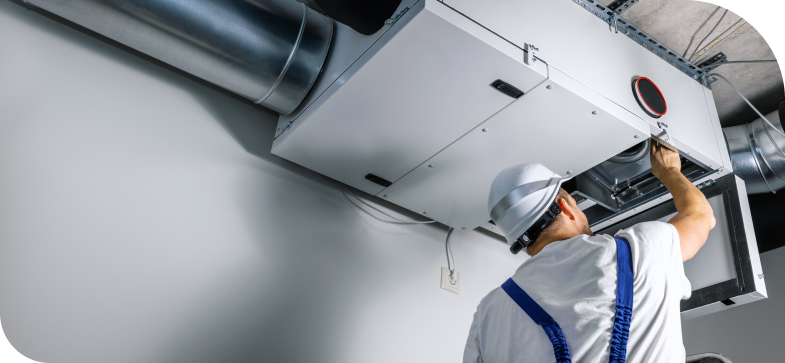Skilled Ductless Mini-Split Installation for Zoned Cooling and Heating Control
Skilled Ductless Mini-Split Installation for Zoned Cooling and Heating Control
Blog Article
Discover Comprehensive A/c Solutions for All Your Heating & Cooling Needs
In the globe of home comfort, the option of a suitable a/c system plays a critical duty. Whether it's the sweltering warm of summer season or the attacking cold of winter season, a reputable cooling and heating service makes certain a balanced interior environment. House owners should navigate a selection of choices, from energy-efficient designs to innovative geothermal solutions. Recognizing these choices not just improves comfort however also maximizes energy consumption. Additional exploration of these systems exposes the detailed equilibrium in between price and functionality.
Understanding Different Kinds of Cooling And Heating Equipments
cooling and heating systems, vital for controling interior climate, vary commonly to fit various settings and constructing needs. Central systems, one of one of the most typical kinds, utilize a network of ducts to distribute conditioned air throughout a structure. These systems usually include elements like heaters, air conditioning system, or heatpump. On the other hand, ductless systems, such as split, multi-split, or mini-split systems, offer direct a/c and heating to details locations without the demand for ductwork, offering more local control and potentially lowering energy losses connected with ducting. An additional alternative is the progressively preferred geothermal heat pump system, which uses below ground temperatures to give cooling and heating, using a green option that can considerably lower energy use over time.
Choosing the Right Heating And Cooling System for Your Home
Selecting the proper HVAC system for your home involves cautious consideration of a number of aspects. Home size substantially affects the system's capacity required to effectively heat and cool down the room. In addition, the climate in which one stays identifies whether to focus on home heating effectiveness, cooling down power, or a balance of both. Energy efficiency scores, such as SEER (Seasonal Power Performance Ratio) for cooling and AFUE (Yearly Gas Utilization Effectiveness) for heating systems, are crucial in choosing an economical device that straightens with financial and ecological goals. Finally, the kind of system-- whether a split system, hybrid, or ductless-- need to line up with the home's architectural style and existing ductwork to guarantee ideal performance and convenience of installment.

The Value of Routine Heating And Cooling Maintenance
After selecting the appropriate Heating and cooling system, preserving its effectiveness and durability comes to be the following step. Normal Cooling and heating upkeep is critical for ensuring that home heating and air conditioning systems operate at peak efficiency. Read Full Article Normal upkeep is an essential part of possessing a Cooling and heating system.
Usual HVAC Troubles and How to Address Them
In spite of normal upkeep, cooling and heating systems can still experience a variety of usual issues that influence their performance and functionality. As an example, filthy filters can block air movement, decreasing system efficiency and stressing its elements. Frequently replacing or cleansing filters can avoid this trouble. An additional constant concern is thermostat breakdowns, which can create the heating and cooling system to run excessively or not enough, bring about pain and increased energy costs. Checking and recalibrating the thermostat can settle this issue. Leakages in refrigerant lines also impact performance, needing professional discovery and repair work. In addition, used out elements like capacitors and fan motors may fall short, necessitating timely repair work to avoid even more significant damages and make certain optimum efficiency.
Assessing the Cost-Effectiveness of Heating And Cooling Upgrades
Why should house owners consider upgrading their heating and cooling systems? Updating a cooling and heating system can substantially reduce energy intake, bring about reduced utility expenses and boosted energy efficiency. Modern systems are developed to be a lot more environmentally friendly, making use of much less power to attain the same level of comfort compared to older models. Additionally, newer devices usually feature advanced functions such as programmable thermostats, which can optimize home heating and cooling routines based on way of life patterns, further improving cost financial savings.
When examining the cost-effectiveness of these upgrades, it is necessary to think about the first financial investment versus long-term financial savings. Typically, the higher furnaces for sale upfront price can be countered by the reduction in continuous power expenditures and upkeep prices. Additionally, several local federal governments provide discounts and rewards for energy-efficient appliance purchases, making upgrades much more cost effective.

Conclusion
In verdict, selecting the suitable HVAC system and guaranteeing routine upkeep are important for optimal indoor comfort and air quality. Numerous systems provide tailored services, making it necessary to recognize the certain demands based on home dimension and local climate.
In contrast, ductless systems, such as split, multi-split, or mini-split systems, supply straight air conditioning and heating to particular areas without the demand for ductwork, supplying more localized control and potentially minimizing power losses associated with ducting. The type of system-- whether a split system, crossbreed, or ductless-- have to align with the home's structural style and existing ductwork to make certain optimal performance and ease of setup.

Report this page